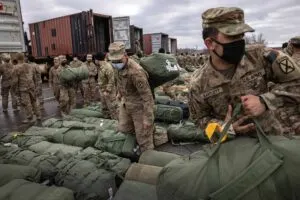Kabul has fallen. The Taliban have seized control in Afghanistan, just two weeks before the United States is due to complete its force withdrawal after a two-decade conflict. As Afghan security personnel trained and equipped by the US and its allies faded away, militants swept over the nation, seizing all major cities in a matter of days. Americans will now engage in their normal partisan indignation for a few weeks, and then Afghanistan, like everything else in a country with an attention span as short as a fast-food ad, will be forgotten. Much of what transpired in Korea and Vietnam which eventually resulted in a draw and a defeat, if we're being precise was beyond the U.S. control. But, Afghanistan was different.
Let’s unfold the events that happened in Afghanistan in the past few days and what comes next: The Taliban, an Islamist militant organization that ruled the country in the late 1990s, has seized power once again. The militants were driven out of power by the US-led invasion of Afghanistan in 2001, but they never left. After a recent assault across the country, the Western-backed administration that has ruled the country for the last 20 years crumbled. The Taliban have taken control all over the country and of all installments except the Hamid Karzai International Airport (HKIA). International organizations, donors, media outlets, and embassies are evacuating their citizens from the country. The only chance to left Afghanistan is now HKIA. The U.S. is evacuating its diplomatic staff at a rapid pace. Many countries have discontinued their diplomatic operations, some have shifted to the HKIA, but Pakistan, Russia, and China are operating their diplomatic missions in full swing. Why are people fleeing the country? Many Afghanis are desperate to leave the country as well. They are concerned that the nation would devolve into disorder, or that the Taliban will launch retaliatory strikes against people who have cooperated with the Americans or the government. Many people are also concerned that the Taliban would re-impose the severe interpretation of Islamic law that they used when they ruled Afghanistan from 1996 to 2001. Women were not allowed to go to school or work outside the house at the time. When they went outside, they had to wear the all-encompassing burqa and be escorted by a male relative. The Taliban outlawed music, severed thieves' hands, and stoned adulterers. In recent years, the Taliban have attempted to portray itself as a more moderate organization, promising not to pursue retribution, but many Afghans are suspicious of such assurances and prefer leaving their country. Why didn’t the Afghan national forces resist the Taliban re-gain? Over a two-decade period, the United States and its NATO partners invested billions of dollars to train and equip Afghan security forces. The Western-backed administration, on the other hand, was riddled with corruption. Commanders overstated the number of soldiers to divert resources, and troops in the field frequently lacked ammunition, supplies, and even food. Their morale was further undermined as it became obvious that the United States was on its way out. As the Taliban moved swiftly in recent days, whole regiments surrendered after brief engagements, and Kabul and other neighboring provinces fell without a fight.
What happened to President Ashraf Ghani? As the Taliban surged over the nation, President Ashraf Ghani dug down and made few public remarks. He fled Afghanistan on Sunday, as they approached the city, stating he opted to flee to avoid additional carnage. The country’s premier, President, and leader of millions; Ashraf Ghani fled the country after negotiations at the Presidential palace in Kabul moderated by Abdullah Abdullah. Ashraf Ghani’s plane flew with his close aides to Turkmenistan but was not permitted land. Then it flew to Uzbekistan and permission was not granted to land. According to recent reports, Ashraf Ghani is presently in UAE.
Is the fall of Kabul similar to the fall of Saigon? The fall of Saigon by North Vietnamese forces in 1975 effectively ended the Vietnam War. After hundreds of Americans and their Vietnamese handlers were evacuated out of the city in helicopters, it became an enduring emblem of defeat. Americans are not ready to compare the fall of Kabul with the Fall of Saigon as the U.S. Secretary of State Antony Blinken rejected any sort of comparison between both by saying that “This is manifestly not Saigon”.
What is expected next in Afghanistan? No one can tell what will happen from now on in Afghanistan. The Taliban have stated their desire to create an inclusive, Islamic government with other forces. They are negotiating with prominent politicians, including previous government officials. They have promised to implement Islamic law while also providing a safe atmosphere for the restoration of regular life after decades of conflict. However, many Afghans are skeptical of the Taliban and worry that their rule would be as harsh and repressive as before. One worrying indicator is that they want to rename the country the Islamic Emirate of Afghanistan like their previous reign.
Will Afghanistan become the heaven of another Al-Qaeda? The Taliban committed to fight terrorism and prevent Afghanistan from becoming a base for attacks under the peace agreement reached with the US last year. However, the United States has limited leverage to enforce this. Nevertheless, top Pentagon officials stated early this year that an extremist group such as al-Qaida may be able to revive in Afghanistan, and authorities are now warning that such groups may develop far quicker than predicted. Other religion-centric horrific attacks on the Shi’ite minority in Afghanistan is another worry. ISIS accepted the responsibility of such attacks in the past and both militant groups have fought over territory before. But, it is still unknown that the Taliban government will be willing to suppress ISIS in Afghanistan or it will grow to become a threat to regional security and stability. The Taliban paid a high price for supporting AlQaida after the September 11 attacks, and they are likely hoping to avoid a recurrence as they strive to cement their power. Here’s to the cautious optimism!



